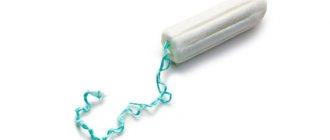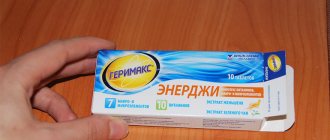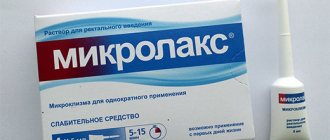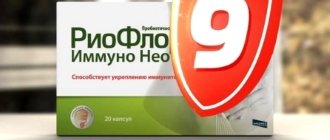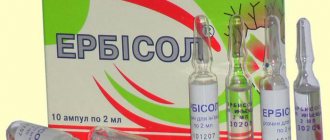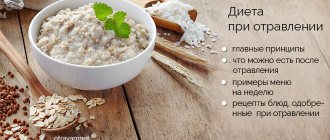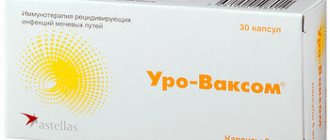Imunorix is an immunostimulating drug. Its task is to strengthen the immune system and resistance to most viral diseases. As you know, the body cannot always cope with viruses that have entered inside on its own. For example, during exacerbation of epidemics, which is especially evident in the spring-autumn period. Or during severe infections of the body.
Imunorix: composition and release form
Each bottle of Imunorix contains: 500 mg. pidotimod (active ingredient) and excipients: - 5 mg sodium sazarinate; - 5.6 mg sodium chloride; - 3.5 mg disodium edetate; - 10.3 mg sodium methyl parahydroxybenzoate; — 2500 mg sorbitol 70%; - 1.6 mg sodium propyl parahydroxybenzoate; — 21 mg fruit flavoring; — 7 ml purified water; - 6.1 mg dyes.
The drug is available in the form of a transparent red-violet liquid. It has a specific smell of wild berries and is packaged in disposable bottles (7 ml each). There are 10 bottles in a cardboard pack.
Interaction with other drugs
Considering that the active substance "Imunorix" does not interact with plasma proteins, pharmacokinetic interactions with other drugs are not expected.
But the drug may affect the effectiveness of therapy with drugs that affect the activity of the immune system.
Animal studies were conducted on the interaction of Imunorix with the following groups of drugs:
- Diuretics.
- Non-steroidal anti-inflammatory drugs.
- Anticoagulants.
- Medicines to lower blood pressure.
- Antipyretics.
- Analgesics.
- Antiepileptic drugs.
During the studies, no negative interactions were identified.
Imunorix: indications and contraindications
The use of the drug Imunorix, the instructions for which are included in the kit, is associated with pronounced immunostimulating properties. Therefore, the drug is indicated for immunocorrection for viral infections of bacterial and fungal origin of the lower and upper urinary tract. This drug is used in complex therapy.
Contraindications of the drug are due to the following factors: - pregnancy and breastfeeding (lactation); - hypersensitivity to the components included in the drug; - children under 3 years of age.
In addition, Imunorix is recommended to be used with extreme caution in those patients who have previously exhibited any allergic reactions, as well as in patients with hyperimmunoglobulinemia E syndrome.
Side effects
The following side effects may occur when taking the drug:
- Acute pain in the abdominal area;
- Presence of heartburn;
- Uveitis;
- Henoch-Henoch Purple;
- Vomiting;
- Diarrhea;
- Infrequent manifestations of subcutaneous dermatitis;
- Rashes that are an allergic reaction of the body.
Allergic reactions can manifest themselves in the form of a rash, swelling, itching, and redness of the skin. Most often, this is a complication caused by intolerance to one of the components of the medication.
Imunorix: instructions for use
It is recommended that adults use this drug 2 bottles (800 mg pidotimod) twice a day, before or after meals. The required course of treatment is 15 days.
Imunorix is prescribed to children only after they reach 3 years of age. It is recommended that children take the drug 1 bottle (400 mg pidotimod) 2 times a day, regardless of meals (before or after meals). Duration of use is 15 days.
The amount of the drug taken and the duration of use may be adjusted. The doctor who prescribes the drug is guided by the severity of the disease, the symptoms of the disease and the individual characteristics of the patient’s body. It is necessary to take into account that the duration of the course of use should not exceed 800 mg. for children, and for adults – 1600 mg.
Imunorix is an effective aid to the immune system. Description of the drug, analogues..
Increasingly, parents are turning to pediatricians with complaints about frequent colds and infectious diseases in children attending preschool and school institutions. This problem is the most pressing today; frequent infection leads to chronic forms and complications, followed by disability.
According to WHO statistics, every year 15% of the world's population suffers from ARVI or influenza. Deaths due to epidemics account for 4 million children annually, 75% of deaths occur as a result of a terrible complication - pneumonia.
Medicine does not stand still; science is constantly looking for new drugs that reduce the incidence of diseases, complications and deaths. New vaccines and immunostimulating drugs are being created to resist the onslaught of seasonal viruses and bacteria.
The drug Imunorix is a new product on the Russian market, which has proven itself to be the best in the treatment of adults and children in the field of therapy, pediatrics, otolaryngology, urology, etc.
When the body is weakened for certain reasons, the protective functions cannot cope with their direct responsibilities, in these cases outside help is needed. The right approach helps to correct the immune system and restore its function.
So, having studied the basic principles of the body’s defenses, humanity is inventing new drugs that help the body overcome the negative influence of antigens. These medications include immunostimulating drugs.
The first immunostimulating drug is considered to be a vaccine containing killed or weakened strains of microorganisms. Thus, humanity managed to defeat such dangerous diseases as smallpox, polio, whooping cough, etc.
Over time, pharmaceuticals learned to synthesize drugs and develop new dosage forms.
One of the new drugs that improve immunity includes Imunorix, which is unique in its active substance and is suitable for both adults and children.
The drug is effective for frequent relapses of diseases of the respiratory and urinary systems, both for adults and children.
Immunity is the body's security agency
The human body is thought out by Mother Nature down to the smallest detail. The main defender against external harmful factors is immunity. A complex mechanism does not allow foreign agents, scientifically called antigens (bacteria, viruses, fungi, allergens, toxic substances, etc.) to disrupt the proper function of organs and systems.
A little history. The founders of those who discovered the principle of the immune system are the Russian scientist physiologist I.I. Mechnikov and the German P. Ehrlich.
Thanks to these discoveries, humanity has learned to fight dangerous infections. The scientists were awarded the Nobel Prize in 1908.
Main organs of the immune system:
- red bone marrow;
- tonsils;
- thymus;
- The lymph nodes;
- spleen.
How the immune system works:
1. the antigen will enter the body (by airborne droplets, through blood, by contact), in the case of viral infections this most often occurs through the respiratory tract;
2. the immune system begins to recognize the foreign agent;
3. then the production of special cells occurs - defenders, which are called antibodies, binding to antigens, they are completely eliminated.
Physiologically, two types of immunity are distinguished:
- congenital;
- acquired.
In children, the immune system after birth is not developed enough to perceive external factors. The child's immunity is improved with the help of:
- mother's milk, which contains a number of amino acids and antibodies necessary for the further development of defenses;
- early vaccination.
Why do children often get sick?
Are you familiar with the situation, a child went to kindergarten and began to constantly get sick with acute respiratory infections, acute respiratory viral infections, influenza, tonsillitis, bronchitis, and pneumonia. This is where parents ask themselves: “Why? After all, everything was fine until now!” This eternal question torments many parents who do not understand why their baby often gets sick, even if they follow proper nutrition, a daily routine, and periodic trips to the sea.
Let's take a short excursion into physiology. During the first years of life, the immune system has a number of features, namely low resistance to infections. In childhood, phagocytosis is imperfect.
By nine months, immunoglobulins type A and G, which were received from the mother in utero and during natural feeding, are completely removed from the child’s body, and their own are produced in insufficient quantities.
These features of the immune system are the prerequisites for frequent diseases in childhood.
The frequent occurrence of respiratory diseases in children in the first years of life is associated with the structural features of the bronchopulmonary system: high reactivity of the bronchi, anatomical narrowness of the bronchi and trachea, loose mucosa, and increased mucus production.
Due to this feature of the anatomical structure of the respiratory system in children, a third of cases of bronchial obstruction occur against the background of acute respiratory infections and indicate the development of bronchial asthma due to infectious allergic genesis.
Long-term infection of the body leads to impaired immunity and a further chronic course of the disease, followed by the addition of various types of infection.
Such children should be constantly in the sight of pediatricians; they are prescribed certain regimens of immunostimulating drugs, according to diagnostic studies. Uncontrolled use of medications can complicate the course of the disease.
Before you continue reading: If you are looking for an effective method of getting rid of a runny nose, pharyngitis, tonsillitis, bronchitis or colds, then be sure to look at this section of the site after reading this article. This information has helped so many people, we hope it will help you too! So, now back to the article.
Stop frequent acute respiratory infections! Imunorix - instructions for use
The active substance included in the drug is pidotimod, which stimulates immunity at all levels: cellular, humoral, increases phagocytosis, increases the release of immunoglobulins.
One of the unique properties of the drug is its effect on dendritic cells, which play a leading role in the infectious process. Thus, the drug has not only therapeutic properties, but also preventive ones.
In Europe, Imunorix has been used since 1999 with confirmed therapeutic positive results; in Russia, the drug began to be used in 2008. Studies have revealed a significant reduction in disease relapses.
Indications
The drug is indicated for adults and children over 3 years of age. Imunorix is used for the following conditions:
- in case of acute pathologies of infectious etiology;
- ENT diseases;
- for diseases of the bronchopulmonary system;
- for diseases of the urinary tract;
- in case of frequent recurrent infectious diseases.
Immunologists speak of Imunorix as an effective drug that gives good results in combination with the main therapy. The drug is indicated for children prone to frequent episodes of respiratory diseases, which lead to a weakening of the body's protective functions and the addition of other infections against this background.
Release form
Imunorix is available in a dosage of 400 mg in a 7 ml bottle for oral administration. The solution is red-violet, transparent, with the taste of wild berries. This form of release makes it possible to prescribe the drug to children without any problems.
How to take Imunorix correctly
Many parents believe that there is a magic pill in the world that will save their child from all diseases.
I hasten to debunk this erroneous opinion, dear adults, it is not for nothing that doctors have been gaining knowledge at universities for a long time, and you are trying to cure your child or yourself using the Internet.
Naturally, all the medications you choose not only do not bring the desired result, but can also seriously affect your health.
If you have been prescribed Imunorix by your doctor, you must adhere to the correct dosage to avoid side effects.
In adults and children over 12 years of age, the drug is used in the acute period, 800 mg 2 times a day an hour before meals or an hour after meals, the duration of administration is at least 14 days.
For prophylactic purposes, the drug is prescribed 800 mg once a day, preferably in the morning on an empty stomach or an hour after meals, for 60 days.
Imunorix for children over 3 years of age is prescribed 400 mg 2 times a day an hour before meals or an hour after meals, the duration is at least 14 days.
As a prophylaxis, the drug is prescribed 400 mg once a day, preferably in the morning on an empty stomach or an hour after a meal, the duration is 60 days.
Side effects
The drug is well tolerated in some cases, but some side effects are possible:
- allergic reactions: rash, hyperemia, swelling or allergic respiratory reactions;
- possible increase in temperature;
- very rarely pain in the abdomen, diarrhea.
To prevent side effects in adults and children, Imunorix is used strictly according to the instructions.
Compatibility with other drugs
The active substance of the drug pidotimod does not have a binding property with blood plasma proteins and is therefore not metabolized, as a result of which pharmacokinetic interactions are not observed.
There is an effect on the effectiveness of other drugs that stimulate the activity of the immune system.
The composition of the drug Imunorix allows it to be combined with other drugs: hypoglycemic drugs, antiepileptic drugs, antihypertensives, antipyretics, painkillers, diuretics, antibiotics.
Analogues of the drug Imunorix
According to the pharmacological group of immunomodulators, the following drugs are analogues of Imunorix:
- Anaferon (adults and children);
- Aktipol;
- Arbidol;
- Broncho Vaxom;
- Bronchomunal;
- Wobenzym;
- Galavit;
- Groprinosin;
- Derinat;
- Immunal;
- Imudon;
- IRS19;
- Yodantipyrine;
- Lycopid;
- Myelopid;
- Neuroferon;
- ORVItol NP;
- Polyoxidonium;
- Profetal;
- Ribomunil;
- Ruzam;
- Splenin;
- Stimforte;
- Taktivin;
- Timalin;
- Thymogen;
- Thymusamine;
- Trekrezan;
- Uro Vaxom;
- Tsitovir 3;
- Erbisol;
- Ergoferon;
- Estifan;
- Echinacea;
- Echinocor.
Many of the listed drugs are Russian analogues of Imunorix.
The choice of Imunorix depends on the type of problem and mechanism of action. The drug has proven itself for more than 20 years as an effective remedy that improves and restores the immune status of frequently ill children. Conducted scientific studies and positive reviews from doctors about the drug Imunorix prove its effectiveness in recurrent diseases.
As observations of European and Russian specialists have shown, the medicine:
- effective for acute, recurrent and chronic diseases of the upper and respiratory tract, especially with obstruction, for example, with croup or obstructive bronchitis;
- effective for urinary tract diseases;
- has a positive therapeutic effect in the treatment of ENT diseases;
- clinically and immunologically effective, thus can be used as a prophylactic for frequent respiratory infections;
- restores precisely the damaged parts of the immune process, thereby can be prescribed with antibiotics without causing allergic and toxic side effects;
- Suitable for adults and children.
Imunorix: cost and sale
Imunorix, the price of which is about 750 rubles for 10 bottles, is a fairly popular drug. Imunorix, often used in medical practice, can be easily purchased at any pharmacy, in a specialized department of a supermarket, or using the services of online pharmacies. But when buying this drug, you should not lose sight of the fact that today’s pharmacological market has a large number of counterfeit products, and this does not exclude the possibility of the existence of a counterfeit of this drug. Therefore, in order not to waste money on an inappropriate product, when purchasing, be sure to check with the seller for a certificate that confirms the quality and indicates the expiration date of the product.
The use of the drug Imunorix, reviews of which are mostly positive, can still cause side effects. Therefore, before using Imunorix for children or adults, you should definitely consult your doctor. In addition, you should definitely study the manufacturer’s instructions, since this instruction is presented only to familiarize the consumer with this product.
Treatment during pregnancy and breastfeeding
No studies have been conducted on humans, but animal experiments have proven the safety of the drug for the developing fetus. In the case of humans, doctors still recommend not using the drug in the first trimester, when all important organs are actively developing.
As for the second and third trimester, Imunorix therapy is recommended for pregnant women if the benefit for the expectant mother outweighs the risk for the developing baby. Treatment should be accompanied by constant medical monitoring of the condition of the mother and child. You should not self-medicate during this important period for a woman.
There is no exact information about the effect of the drug on the baby if breastfeeding is carried out, so the woman should either postpone therapy or stop breastfeeding for the duration of treatment.
Imunorix and Transfer Factor
In order to undergo the necessary course of therapy with Imunorix, the price of which usually does not exceed 750 rubles for 10 bottles, the patient will need to take approximately 30 bottles. Accordingly, the cost of treatment will cost about 2,300 rubles. It is worth considering the fact that to achieve the desired result, the course of treatment may need to be repeated several times.
Transfer factor is a drug that performs exactly the same
same function, costs about 2,000 rubles for a package of 90 capsules. But at the same time, Transfer Factor, which contains natural ingredients, does not cause side effects or addiction to the body. Therefore, there are no contraindications to taking this drug. It is also impossible to overdose with this drug.
The mechanism of action of Transfer Factor is unique in that this immunomodulator, unlike similar drugs, is capable of correcting disturbances in the structure of human DNA. This feature of the drug allows you to eliminate the cause of the disease and prevent the emergence of new diseases. Therefore, the effect of Transfer Factor on the human body is much deeper and more dramatic than other similar drugs, because it not only treats the consequences of diseases, but also restores disorders in the immune system and provides the necessary protection for the body.
pharmachologic effect
Immunostimulating drug.
Pidotimod stimulates and regulates cellular immunity. Induces the maturation and formation of immunocompetent T-lymphocytes in case of their deficiency, which assume the role of coordinators of specific immunity under physiological conditions due to partial replacement or enhancement of the functions of the thymus gland. In addition, pidotimod stimulates macrophages, whose main function is to capture antigen and present it on the cell membrane in combination with histocompatibility antigens. The body's ability to resist infectious agents is expressed in effective specific immune, cellular and antigen-antibody protective responses.
Pidotimod exerts therapeutic effects through immunostimulating effects on innate immunity and antibody production, cellular immunity and cytokine production. Pidotimod increases the production of superoxide anions, tumor necrosis factor alpha, NO (bactericidal effect), as well as chemotaxis and, accordingly, phagocytosis. The drug also increases the cytotoxic activity of natural killer cells.
Pidotimod enhances the functional activity of T and B lymphocytes, increases stimulation of the antigen-antibody reaction and prevents the development of apoptosis induced by dexamethasone, 12-O-tetradecanoylphorbol-13-acetate and calcium ionophore A-23I87.
Pidotimod increases interleukin-2 (IL-2) levels in aged rats and IL-2 gene expression in the spleen of rats. In particular, pidotimod has been shown to have an immunostimulating effect in cases of immune system deficiency, as well as when it functions at a physiological level.
